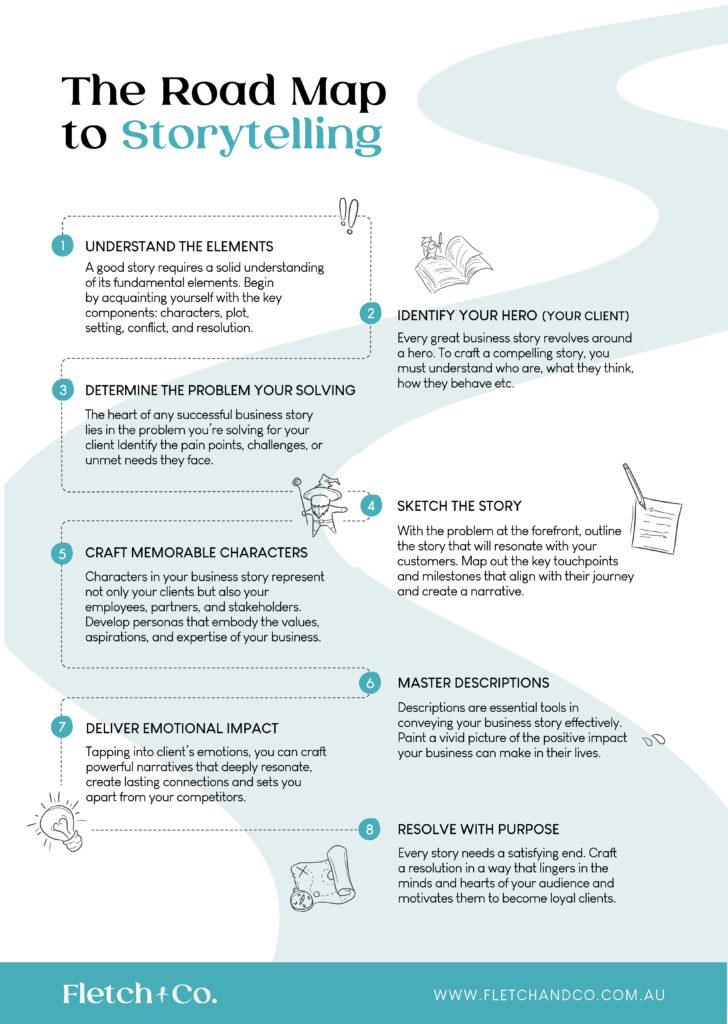Storytelling is a powerful tool and holds immense sway in the business world. Engaging tales can not only grab the attention of your audience but also capture long-lasting loyalty and establish significant relationships. The key to a compelling business narrative lies in truly comprehending and resonating with your main character—your client.

Step 1: The Foundation - Understanding the Elements
Just like a solid foundation is vital for any business, a good story also requires a strong understanding of its fundamental elements. Familiarise yourself with the key components: characters, plot, setting, conflict, and resolution. In the context of business storytelling, your hero—your client —is at the core of your narrative. Gain a comprehensive understanding of your client’s needs, desires, and pain points to build a story that resonates and engages.
Step 2: Identifying Your Hero – Your Client
Every great business story revolves around a hero—the client. To craft a compelling narrative, you must delve deep into the world of your clients to understand their aspirations, challenges, and motivations. Conduct thorough market research, analyse feedback, and engage in meaningful conversations. By truly knowing your customer, you can create a story that addresses their needs and positions your business as their ultimate solution.
Step 3: Determine the Problem You're Solving
The heart of any successful business story lies in the problem you’re solving. Identify the pain points, challenges, or unmet needs your customers face. Dive into the intricacies of these problems, exploring the impact they have on your hero’s life or business. Clearly articulate the problem in a way that resonates with your audience, evoking empathy and understanding. By highlighting the problem, you set the stage for the solution your business provides.
Step 4: Sketch the Story
With the problem at the forefront, outline the story that will resonate with your client. Map out the key touchpoints and milestones that align with their journey. Craft a narrative structure that highlights how your business addresses their pain points and leads them towards a solution. Remember to infuse your story with authenticity, transparency, and a clear value proposition that sets you apart from competitors.
Step 5: Craft Memorable Characters
Characters in your business story represent not only your clients but also your employees, partners, and stakeholders. Develop personas that embody the values, aspirations, and expertise of your business. Create relatable characters that reflect the diverse backgrounds and perspectives of your audience. These characters will add depth to your story, humanise your brand, and connect with your customers on an emotional level.
Step 6: Master Descriptions
Descriptions are essential tools in conveying your business story effectively. Craft compelling dialogue that speaks to your customers’ language and resonates with their emotional needs. Use vivid and evocative language to describe your products, services, and brand values. Paint a picture of the positive emotional impact your business can make in their lives. Let your words evoke empathy, excitement, or comfort, touching the emotions of your audience.
Step 7: Deliver Emotional Impact
People are more likely to remember a feeling, rather than what you tell them or what they read. Incorporating emotion into your business storytelling enables you to create a powerful narrative that resonates with your audience, sets you apart from competitors, and drives meaningful engagement and action. By harnessing the power of emotion, you can build a strong emotional connection with your customers and cultivate a loyal and enthusiastic following for your business.
Step 8: Resolve with Purpose
Every story needs a satisfying resolution, and in business storytelling, it should be one that brings emotional fulfillment to your hero. It’s the moment where you solidify the connection with your audience, provide solutions, inspire action, and leave a positive and memorable impression.
Conclusion
Great brands are great storytellers. They understand that stories have the power to captivate and engage audiences on a deeper level. Top brands leverage storytelling to communicate their brand values, evoke emotions, and create memorable experiences. By telling stories that resonate with their target audience, these brands forge meaningful connections, differentiate themselves from competitors, and establish a strong brand narrative.
are you ready to grow your business?

Free Chat
Not sure exactly what you’re needing, or how we can help? Book in for a free 20-min chat via zoom to find out if we’re the right fit and how we can move you forward for sustainable growth.

Happy Hour?
Buckle in for a 60-min Happy Hour session that is tailored to your marketing needs and wants. Got a problem you’re stuck on? Want some fresh ideas? Need some unbiased outside feedback? Or simply need a nudge in the right direction? We got you.

Mentoring
Are you ready to level up your marketing knowledge and experience so you can consistently and effectively market your business with purpose, in all the right places equipped with all the right tools?

Consulting
Need a fresh set of eyes to get clients over the line? Let us facilitate your next marketing workshop to build a sure-fire strategy to help identity new opportunities, execute decisions and achieve clarity, focus and market-driven results.

